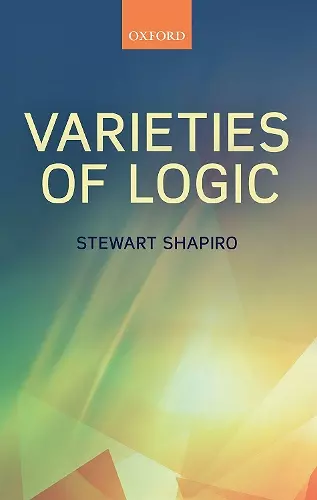Varieties of Logic
Format:Paperback
Publisher:Oxford University Press
Published:16th Jun '20
Currently unavailable, and unfortunately no date known when it will be back
This paperback is available in another edition too:
- Hardback£77.00(9780199696529)

Logical pluralism is the view that different logics are equally appropriate, or equally correct. Logical relativism is a pluralism according to which validity and logical consequence are relative to something. In Varieties of Logic, Stewart Shapiro develops several ways in which one can be a pluralist or relativist about logic. One of these is an extended argument that words and phrases like 'valid' and 'logical consequence' are polysemous or, perhaps better, are cluster concepts. The notions can be sharpened in various ways. This explains away the 'debates' in the literature between inferentialists and advocates of a truth-conditional, model-theoretic approach, and between those who advocate higher-order logic and those who insist that logic is first-order. A significant kind of pluralism flows from an orientation toward mathematics that emerged toward the end of the nineteenth century, and continues to dominate the field today. The theme is that consistency is the only legitimate criterion for a theory. Logical pluralism arises when one considers a number of interesting and important mathematical theories that invoke a non-classical logic, and are rendered inconsistent, and trivial, if classical logic is imposed. So validity is relative to a theory or structure. The perspective raises a host of important questions about meaning. The most significant of these concern the semantic content of logical terminology, words like 'or', 'not', and 'for all', as they occur in rigorous mathematical deduction. Does the intuitionistic 'not', for example, have the same meaning as its classical counterpart? Shapiro examines the major arguments on the issue, on both sides, and finds them all wanting. He then articulates and defends a thesis that the question of meaning-shift is itself context-sensitive and, indeed, interest-relative. He relates the issue to some prominent considerations concerning open texture, vagueness, and verbal disputes. Logic is ubiquitous. Whenever there is deductive reasoning, there is logic. So there are questions about logical pluralism that are analogous to standard questions about global relativism. The most pressing of these concerns foundational studies, wherein one compares theories, sometimes with different logics, and where one figures out what follows from what in a given logic. Shapiro shows that the issues are not problematic, and that is usually easy to keep track of the logic being used and the one mentioned.
Wide-ranging and thought-provoking. * J. P. Studd, Mind *
Stewart Shapiro's book is convincing ... The case for logical pluralism has been made before, but with Shapiro's book we get an argument for pluralism that promises to resonate not only with logicians but with classical mathematicians. * Ole Hjortland, Philosophical Quarterly *
It is a rich book, which, apart from contributions to logical pluralism, makes connections between the philosophy of logic, philosophy of language, philosophy of math, and epistemology. There is much to like in Shapiro's Varieties of Logic. It is an engaging contribution to the debates over logical pluralism that articulates an appealing pluralist position, and it highlights many fruitful connections between the philosophy of logic and other areas of philosophy. It will be required reading for anyone interested in logical pluralism or the philosophy of logic. * Shawn Standefer, Notre Dame Philosophical Reviews Online *
Varieties of Logic will become the standard text on logical pluralism, and will likely set the agenda for debates on the topic for years to come. * L.M. Geerdink and C. Dutilh Novaes, History and Philosophy of Logic *
ISBN: 9780198822691
Dimensions: 215mm x 137mm x 13mm
Weight: 308g
240 pages